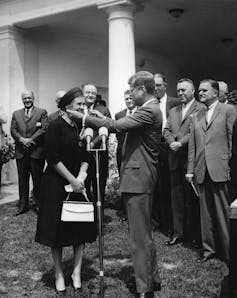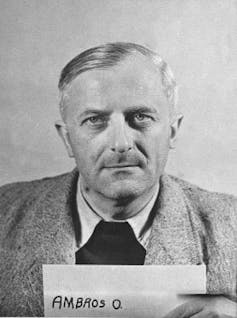Baby Defects F9rn Drug Administered to Wo en for Nausea
In the 1950s, German company Chemie Grünenthal developed a "wonder drug" sleeping pill that information technology marketed around the globe as condom for everyone, including expectant mothers. This mild allaying was as well found to mitigate the effects of morning sickness, resulting in increased use by the population that turned out to be most vulnerable to its risks.
Before long after the drug came on the market, reports of baby deaths and startling nativity malformations were made worldwide. Grünenthal rigorously denied thalidomide'southward association with these agin effects for a long time.
It took until 1962 for the pill to exist banned in most countries and decades of extensive legal battles ensued. More than than half a century later on, the thalidomide crisis is continuing to shed insights on pharmaceutical ethics, scientific integrity and professional person wrongdoing.
Scientists are people too
Fifty-six years after the first known victim of thalidomide was born to a Grünenthal employee, the company'due south master executive officer Harold Stock issued an apology, which did piffling to gratify victims.
Stock said Grünenthal researchers had conducted all possible tests on thalidomide based on latest science. This is directly contradicted past the work of Dr Frances Kelsey, who in 1960, despite pressure from supervisors at the Nutrient and Drug Administration (FDA), refused thalidomide's application for auction in the U.s.a..
She noted important gaps in the information used to support the merits that thalidomide was safety for pregnant women. Kelsey's grooming in pharmacology helped her discover the lack of evidence. So if Kelsey saw the obvious shortfalls in thalidomide's safety profile, then what did Grünenthal scientists know, or ought to take known?

Conventional wisdom suggests that scientists do science; that they are especially trained professionals who acquit inquiry in a style that systematically explores the unknown, minimises bias, and reaches beyond assumptions using latest information and technology.
Whether they piece of work in universities or pharmaceutical companies, scientists are supposed to be governed by scientific principles before anything else. Kelsey demonstrated this principle when she resisted force per unit area from above. But given her heroine status, this may be the exception and non the norm.
For pragmatic scientists who depend on their employment or enquiry funding, these principles could be compromising. Relaxing them can exist rationalised every bit normal or acceptable, with hidden biases taking root and impacting how they conduct research and subsequent results.
Subtle decisions (ofttimes perfectly legal) can distort medical inquiry and decadent scientific knowledge. With most of united states assertive we are "good people", it follows that scientists may resist acknowledging their subtle shifts in arroyo and in that location are always reasons to explicate it away.
Grünenthal's alleged "omit and so deny" strategy fits this perfectly.
By not conducting the tests Kelsey inquired about, Grünenthal could gratis itself from evidence that would limit its market for the drug. By challenge it was not normal do to test for the effects of medications on developing fetuses, Grünenthal could argue against any obligation to conduct these tests.
Indeed, the claim that these tests were uncommon formed one of the pillars upholding Grünenthal's denial of responsibility.
Corporate culture and Nazi war crimes
Some have speculated that Grünenthal's culture was tainted because several World War Two Nazi war criminals – including Otto Ambros, a scientist constitute guilty of mass murder at the Nuremberg trials – had been employed there.
But how much should we rely on this "bad apple" narrative when trying to brand sense of the thalidomide crisis?

The reality is that many pharmaceutical companies have and go along to be fined, charged, and accused of unethical behaviour related to production and marketing of their drugs.
The scientists who conduct research on these drugs and get tied upwardly in unethical practices are less oft like Nazi state of war criminals, and more than frequently like us. They take pride in their piece of work and have no intention to damage others. But they face pressures that lead to compromises with implications they may cull non to consider.
Complicating matters is the unique set of risks faced by scientists who speak up for public condom confronting the wishes of their funders or superiors. In doing then, they risk their reputations, employment and hereafter funding opportunities.
German language paediatrician Dr Widukund Lenz was allegedly threatened with legal action by Grünenthal after he suggested a possible link between thalidomide, while it was even so being sold, and birth deformities.
Allegations have also been made that Grünenthal attempted to corrupt science by blocking medical publications. In one instance, they were allegedly successful at convincing a medical periodical to purposely delay publication of an article by neurologist Dr Horst Frenkel that demonstrated thalidomide's negative side furnishings. Once again, the drug was still being sold at this time.
Attempting to corrupt the scientific process is not something unique to this particular pharmaceutical company. In fact, attacks on scientists and attempts to distort science are a growing concern.
The story of Canadian scientist Nancy Olivieri peculiarly highlights the tremendous personal costs scientists face speaking up for public safety. The drug company partially funding Olivieri's research (that planned to market the drug afterwards trials) threatened her with legal action if she followed through on her ethical obligation to inform patients and the scientific community the drug she was testing on them was potentially toxic and could exist ineffective.
Simply, like Kelsey, Olivieri went alee despite "severe consequences". She received the 2009 AAAS Award for Scientific Freedom and Responsibleness for her "… decision that patient rubber and research integrity come before institutional and commercial interests".
What now?
More than half a century after the thalidomide crunch, we are notwithstanding haunted past the opportunity for compromised scientific discipline.
Just this year, doctors raised cherry flags on some other popular drug for forenoon sickness (chosen Diclectin in Canada and Diclegis in the U.s.) that is being prescribed in every bit many as 50% of live births in some countries.
Concerned experts merits the published results on Diclectin overstate its benefits, understate its risks, and ignore safer (and cheaper) vitamin alternatives.
Research integrity and the institutional structures that support scientific research are fundamental to understanding and eliminating scientific compromises. Without this understanding, we can't truly progress beyond the "Grünenthal science" that underscored the thalidomide tragedy.
Stay tuned for other instalments in the thalidomide serial this calendar week.
Source: https://theconversation.com/why-did-thalidomides-makers-ignore-warnings-about-their-drug-47092
0 Response to "Baby Defects F9rn Drug Administered to Wo en for Nausea"
Post a Comment